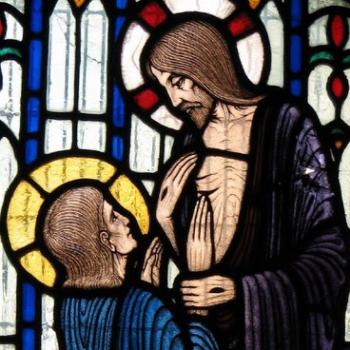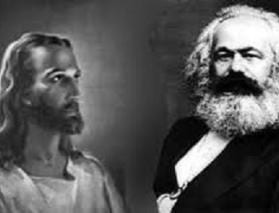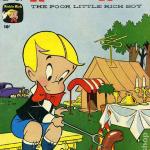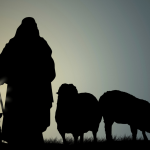In my religious tradition, we didn’t do saints. But we did do Christmas pageants—big time. I remember in various pageants being an angel, a wise man, a shepherd—all of the usual male roles. My most triumphant pageant appearance, though, was the year I got to be Joseph. Wearing a white dish towel on my head secured with a bathrobe belt, I gazed with a holy aspect at the plastic headed Jesus in the make-shift manger while the narrator read the Christmas story. Actually, I was gazing at Mary, played by Bonnie, whom I was planning to marry in 15-20 years. It was my usual pattern when I was in single digits of age. If I thought a girl was cute, I’d think “you’re cute—I wonder what our children will look like.”
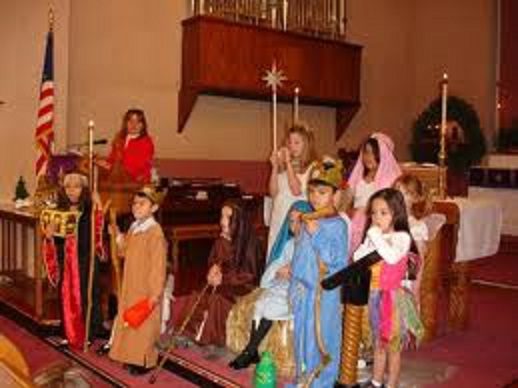
My affinity for Joseph has stayed with me, so I particularly like the birth of Jesus narrative in Matthew’s gospel (even though the story in Luke is better known). Scholars tell us that Matthew’s primary focus is to sell to a Jewish audience that this Jewish man who is the central figure in his narrative, crucified as a common criminal, was actually the promised Messiah. The author’s intentions are clear from the start when the gospel begins with a genealogy that traces Jesus’ ancestry all the way back from his stepfather, Joseph, through King David to Abraham. The author even points out some interesting details in this genealogy that a well-versed Jewish reader or listener would not miss.
It turns out that there are some questionable women in Joseph’s family tree. Salmon, David’s great-grandfather, for instance, marries Rahab whose story is told in the book of Joshua from the Jewish scriptures. The invading children of Israel send spies into the Promised Land to scout out the area; they wind up in Jericho, a walled fortress that is the most important and powerful city in Canaan. We find them in the house of a prostitute named Rahab (what were they doing there?), who hides them from the king of Jericho and helps them escape from the city by dropping a rope from her window for them to climb down in the middle of the night. For her efforts, this non-Israelite prostitute and her family are the only inhabitants of Jericho spared when Joshua and his army, using information from the spies Rahab saved, conquers and destroys Jericho a few chapters later.
Salmon and Rahab’s son is Boaz. Perhaps it is because he is a half-breed that he is willing to marry the foreign widow Ruth. The story of Ruth and Boaz is beautifully told in the Book of Ruth, a hidden and seldom-read gem in the Hebrew scriptures. During a famine, Naomi and her husband Elimelech leave Judah with their two sons in search of sustenance, which they find in the neighboring land of Moab. The sons marry Moabite women, Orpah and Ruth, something which the Mosaic Law prohibited (just as it prohibited Salmon from marrying a foreigner, let alone a prostitute). But all of the men in the story die. Devastated by loss and with no means of support, Naomi sets out to return to Bethlehem after saying goodbye to her former daughters-in-law. Orpah sadly heads back to her family home, but Ruth will not leave Naomi, touchingly saying “Where you go, I will go; where you lodge, I will lodge; your people shall be my people, and your God my God.”
It’s the beginning of an unexpected love story—foreign woman meets wealthy Jewish guy (Boaz). Ruth and Boaz’s grandson, Jesse (who is no more than half Jewish), has eight sons. The eighth son and runt of the litter, consigned to writing poems and killing lions while tending sheep, is David, whom Samuel anoints as the second king of Israel. The line continues through Solomon, who is the product of David’s adulterous relationship with Bathsheba. Even the Messiah’s line has its questionable elements and characters—which should tell us something about the divine plan and priorities.
The birth of Jesus is set up by Matthew not with the women of the story, Elizabeth and Mary, in central roles but rather with Joseph, the descendant of David. What do we learn from Matthew and from Luke, the only other gospel in which Joseph appears, about Joseph?
First, Joseph is the strong, silent type. While other major players in the stories of Jesus’ birth and formative years get major speaking parts, we have no record of Joseph ever saying anything. Mary gets the Magnificat, angels are singing and messaging at the drop of a hat, John the Baptist gets to yell “Repent,” Zachariah has the “Song of Zachariah,” the wise men have a brief speaking role, and even the minor character Simeon gets to contribute a song before he dies. But Joseph is silent. In reality, I suspect, he was capable of speech when necessary—“What the hell do you mean there’s no room at the inn? I made these reservations last month! I’ve got a pregnant wife sitting out there on a donkey in the parking lot! Sleep in a stable?? What the fuck?? I want to see your manager!”—but he gets no gospel speaking role.
Second, Joseph is in touch with his inner self in a way that would make modern therapists proud. He pays attention to his dreams and acts on them. Mary briefly argues with the angel at the annunciation in Luke, but when Joseph hears an angel in a dream, he wakes up and acts on what he’s heard. No questions asked. In fact, he’s perhaps the greatest dreamer in the Bible other than his namesake and distant ancestor Joseph from Genesis. The difference between them is that Joseph in Genesis is not the strong, silent type, can’t stop blabbing about his dreams to everyone, and ends up in a well. Jesus’ stepdad knows that some things are meant to be acted on and not talked about.
Third, Joseph clearly is flexible and able to roll with the punches. One would think that the angel Gabriel might have made the annunciation to Mary and Joseph together, but no. Only Mary gets the message. We aren’t told if Joseph finds out that Mary is pregnant because she tells him her story or because he happens to notice that she’s putting on weight, but because he is a “just man” he chooses to break their betrothal privately rather than making a public display of it as the law would have allowed. Finally, an angel gets around to telling Joseph in a dream and the betrothal is back on—but no sex until Jesus is born. The New Testament and tradition indicate that Mary and Joseph did have several children in the years after Jesus was born, so at least that worked out.
Finally, Joseph was a stepfather. As part of a “blended family” for the past three decades, I have had the opportunity to observe the challenges of the impossible job of step-parenting from close range. I wonder how Joseph processed being handed an impossible job, with no blueprint or instruction manual. All he wanted to do was marry the person he loved. God said, “Okay, but here are a few other things you get to do too.” Did Joseph ever wonder when it would be “his time,” when he would be valued for who he was rather than for what he could do for Jesus, or Mary, or God? I wonder if Joseph ever saw “you’re not my real dad” in Jesus’ eyes or actions. Did Joseph ever resent Jesus’ biological connection with Mary, something that nothing Joseph ever did or said could possibly balance out? I wonder if Jesus ever told Joseph, at least when he had grown up, that he appreciated Joseph and that he apologized for the times he’d been a jerk.
In Santa Fe, there is a little church called the Loretto Chapel, located for the past many years on the grounds of a downtown hotel, which contains a “miraculous staircase,” built by a stranger with a donkey and a toolbox who showed up in answer to the prayers of the Sisters of Loretto. The newly built chapel needed a staircase to the choir loft; those who knew about such things said it would have to be a ladder, since a regular stairway would be too invasive of the chapel space. The stranger built an architectural marvel, a spiral staircase containing two 360 degree turns with no visible means of support and held together with wooden pegs rather than nails. The stranger disappeared without being paid after completing the staircase; not surprisingly, legend has it that the donkey-riding stranger was none other than St. Joseph, patron saint of carpenters.
I tend to consider such stories to be apocryphal legend, but this does sound like something that Joseph would do. There’s something spectacularly ordinary and efficient about Joseph. Something needs to be done, and he does it. After dealing with a pregnant fiancée he’s never had sex with, sleep-talking angels, a murderous king, lost reservations at the inn, delivering a baby in a barn, and being a stepfather, building a staircase that defies gravity for a bunch of nuns is nothing. Bring it on.
As I had the opportunity this semester to discuss some of the seminal texts of the Christian faith with my freshman students, I reminded them that at the heart of the Christmas story is an outrageously ridiculous, but beautifully attractive, idea: God chose to become human. God continues to engage with the world through humans. We have surrounded ourselves with all sorts of distractions in order to avoid grappling with a most basic truth, a truth worth remembering as we head into the final week before Christmas: God loves us. That changes everything.










